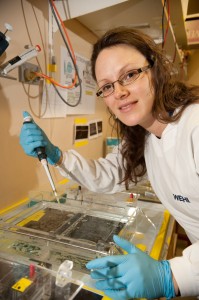Marnie Blewitt
The Walter & Eliza Hall Institute of Medical Research, Melbourne


Zenobia Jacobs wants to know where we came from, and how we got here. When did our distant ancestors leave Africa and spread across the world? Why? And when was Australia first settled?
These are difficult and controversial questions. But Zenobia has a deep understanding of time and how to measure it. She has developed a way of accurately dating when individual grains of sand were buried with human artefacts. And that technique is transforming our understanding of human evolution.
In 1998 astronomers made an astonishing discovery-the expansion of the Universe is not happening at a steady rate, nor is it slowing down toward eventual collapse. Instead, it is accelerating. The discovery required a complete rethink of the standard model used to explain how the Universe works.
“Now we know that stars, planets, galaxies and all that we can see make up just four per cent of the Universe,” says Tamara Davis, a University of Queensland astrophysicist.
“About 23 per cent is dark matter. The balance is thought to be dark energy, which we know very little about.”